Life on Exoplanets
Astrophysicist Didier Queloz on whether we can find life on Mars, Proxima Centauri, and the importance of oxyg...
Can we detect a source of light in the outer solar system by a flux equal to that produced by a large city? Which molecule can be used as a marker for primitive life? Frank B. Baird, Jr. Professor of Science, Avi Loeb, talks on the distance where radio waves from Earth are detectable.
Going beyond the solar system, it would be interesting to know if there is even primitive life. Not to speak about intelligent life, but primitive life. One way to find evidence for primitive life is to look for planets that are orbiting other stars, and by now we know thousands of such candidate planets. We can look for specific planets that are at the right distance from their host star to have life on them, just like the Earth is at the right distance to have liquid water on its surface. If we imagine life as we know it, perhaps there is another planet similar to the Earth orbiting at the habitable zone around another star.
We have been broadcasting radiowaves for about 50 years or 60 years, so there is a bubble around the Earth where radio signals are moving out. This bubble keeps growing at the speed of light. Right now it’s roughly fifty or sixty light-years away from us. If there is another civilization out there, they could in principle figure out that we developed radio technology here. We can do the same thing and search for other civilizations at those distances with existing radio technology.
In 2013 I was curious to know, whether we could in principle detect a nuclear war that a civilization has on an extra-terrestrial planet. I found out that even with the best telescopes, we shouldn’t be able to detect any signal in a reasonable amount of time. Meaning that even a very explosive and bright event like a nuclear war is not easily detectable. So, it’s quite possible that life exists everywhere and it’s very subtle, it’s very difficult for us to see a signature of that life. That’s why we live under the illusion that we are special and that we are unique.

Astrophysicist Didier Queloz on whether we can find life on Mars, Proxima Centauri, and the importance of oxyg...

And how is this related to the development of interdisciplinary scientific fields?

Physicist Paul Hartogh on primordial materials, escape of the atmosphere, and the Giotto mission